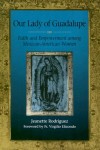Both Jeanette Rodriguez in a section of her book, Our Lady of Guadalupe: Faith and Empowerment among Mexican-American Women, and Gloria Anzaldúa in Borderlands/ La Frontera: The New Mestiza speak to the construction of machismo. For a long time Chicanas and Mexican (American) women been exploited and colonized by sexism (Rodriguez, 70). They have been relegated solely to household duties and rearing of children or to prostitution, completely dismissing the possibility of becoming scholars. Gloria Anzaldúa states, “[f]or a woman of my culture there used to be only three directions she could turn: to the Church as a nun, to the streets as a prostitute, or to the home as a mother” (39). Thus is a product of the patriarchal system that enforces machismo and the subjugation of women. In the church as a nun they are not placed in an equal position as priests. In the realm of prostitution they are perceived as sexual objects utilized by men for their sexual inclinations. They are expected to be at home, cleaning, rearing children and cooking for everyone, every meal. These are traditionally the expectations for Chicanas and Mexican (American) women.
Anzaldúa declares that machismo was constructed by Anglos, but Rodriguez states it “is a response to the dominant culture’s oppression” (Rodriguez, 71). Rodriguez discusses machismo more as a response from the rape indigenous women experienced during the conquest and their inability to fight it thus resulting in “an overly masculine and aggressive response to their women” (Rodriguez, 71). Describing it in modern times, in terms of Chicanos exerting machismo, Anzaldúa says, it’s a “result of hierarchical male dominance […] [t]he Anglo, feeling inadequate and inferior and powerless, displaces or transfers these feelings to the Chicano by shaming him” (105). Anzaldúa describes machismo as a transmission from Anglos to Chicanos as a result of Anglos feeling substandard to the Chicanos.
Through the invasion of the United States in Mexico in 1821 to 1910, Mexicans increasingly began to be displaced from their own lands. The drastic industrialization that was happening in the United States in that period of time, the “Anglo-American conquest transformed Mexicans from a position of citizenship, owners of their own lands, to a colonized people” (Rodgriguez, 67). The more penetration of Anglo-Americans into Mexican lands, the more of an oppressed people they became. As a result of the transformation evolved the idea of machismo.
I think that both Anzaldúa and Rodriguez’s descriptions of the construction of machismo are reasonable. I would have liked to see Rodriguez give more of an in-depth historical analysis than what she is providing in the book. Anzaldúa mentions the need for a new masculinity, one that is not afraid to feel and be vulnerable and create equality between men and women.
Sources:
- Anzaldúa, Gloria. Borderlands La Frontera: The New Mestiza. San Francisco: Aunt Lute Books, 2007.
- Rodriguez, Jeanette. Our Lady of Guadalupe: Faith and Empowerment among Mexican-American Women. Austin: Texas, 1994. Print.
- http://3.bp.blogspot.com/-noJGfSn8LnU/TnwXcPSA2dI/AAAAAAAACUI/mI-4bXJn1Lo/s1600/borderlands.jpg
- http://images.betterworldbooks.com/029/Our-Lady-of-Guadalupe-9780292770621.jpg
- http://www.utexas.edu/utpress/books/rodour.html


I would like to host a book discussion at the Centro about this, please let me know thanks!